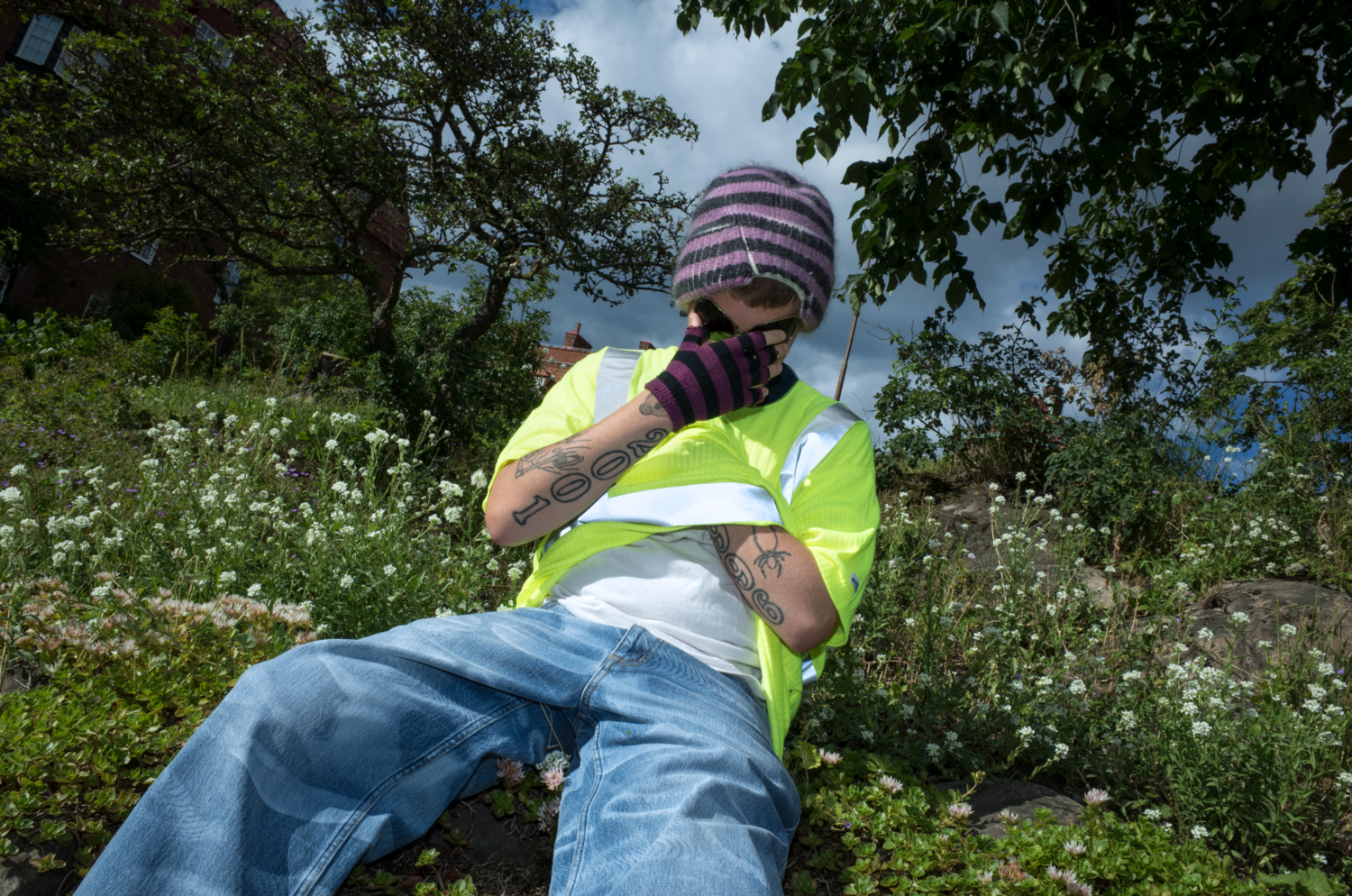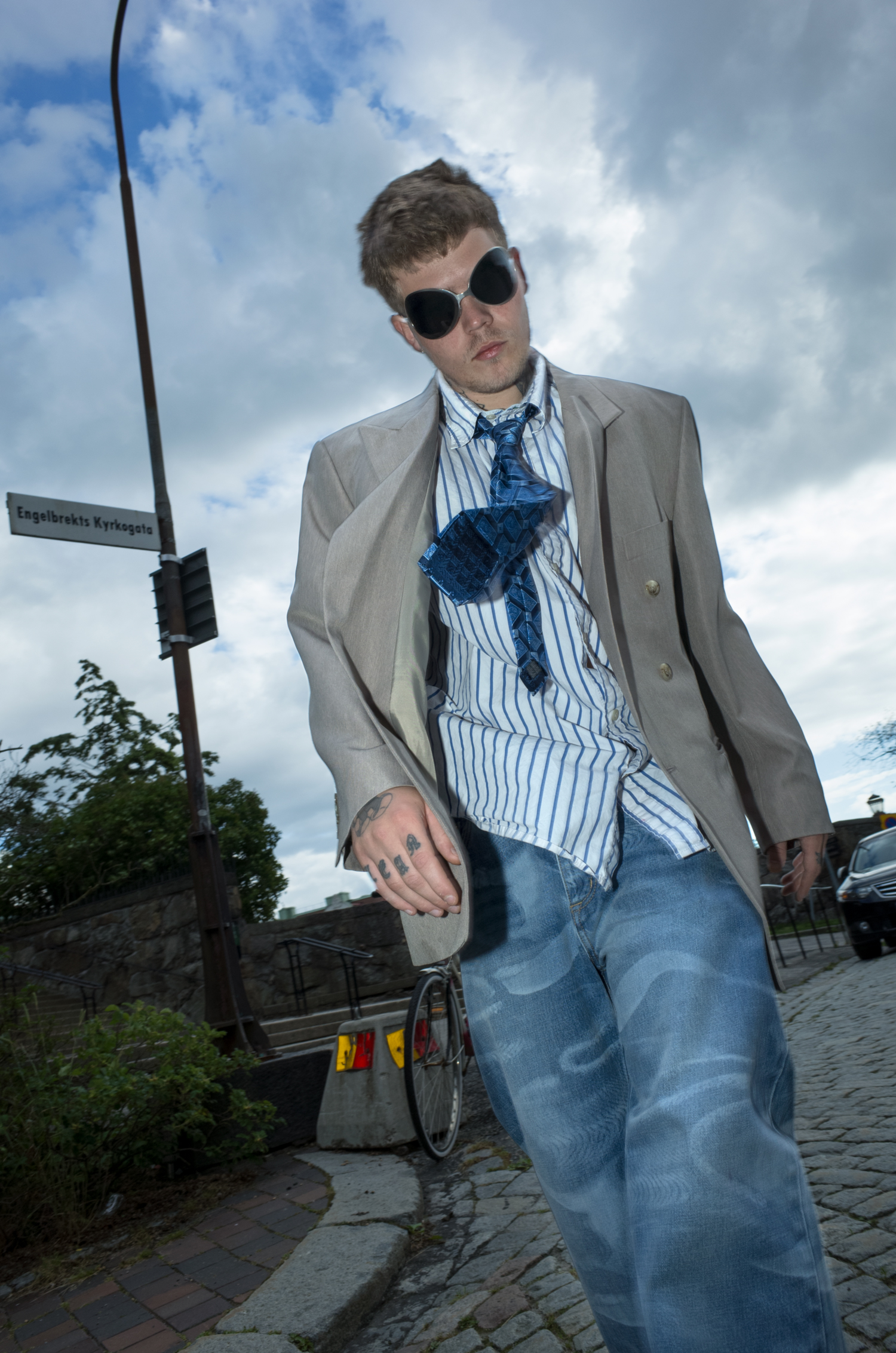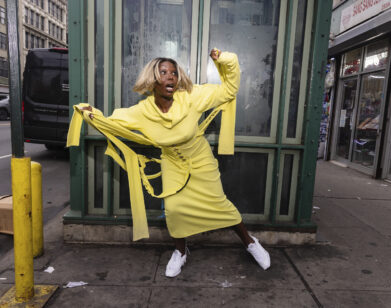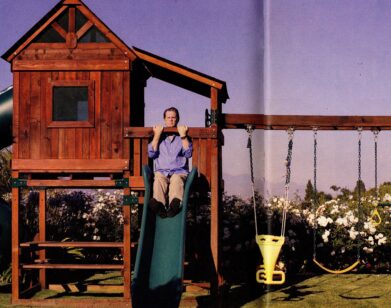Yung Lean and FKA Twigs Play a Game of Would You Rather

At just 23, Jonatan Leandoer Håstad is all grown up. It might sound like a paradox, but in the last 10 years, the Swedish rapper has gone from viral curiosity to music-blog obsession, and has battled and overcome drug addiction and mental health issues (during a hospitalization in 2017, he was diagnosed with bipolar disorder). As Yung Lean, Håstad and his crew of Stockholm-based friends dubbed themselves the Sad Boys, reveling in their outsider status even as they amassed an army of fiercely loyal fans, and helped pioneer a brooding aesthetic that influences the rap world to this day. With his latest album, Starz, Håstad picks up where he left off with 2017’s Stranger, indulging in spaced-out, narcotic production while telling stories about acid trips gone wrong, fleeting romance, and Pokémon. Earlier this month, Håstad connected with his friend, the musician FKA Twigs, who challenged him to a good old-fashioned game of Would You Rather.—BEN BARNA
———
FKA TWIGS: The first time I was introduced to your music, it was through a friend. I came to see you at your Barbican show in London.
YUNG LEAN: I remember that.
TWIGS: It was just such an incredible performance, and what really struck me was how everyone in the audience seemed so connected by the music, and the way that they were dressed, the way that they looked, the age group of the people. It sounds quite like a cult following, and I know it’s been described as a mythic micro-universe that you and Sad Boys built, and I wanted to hear you talk about that, and how you’ve seen that following build.
LEAN: I think it happened naturally. Someone said to me afterwards that that show felt like going to church. With social media, I guess you can feel like you’re really a part of something.
TWIGS: And as you’ve developed as an artist and you’ve had different side projects, how important is it to you that those original kids that were there at the Barbican can still relate to you now?
LEAN: I don’t think it’s good for me to think about it too much. I guess you do alienate some people just by growing and making new shit. How do you feel about it?
TWIGS: I try not to think about it, but, of course, it has played on my mind. You’ve done so many diverse things, like [his lo-fi artrock side project] Jonatan Leandoer127 and [his punk-grunge band] Död Mark. Are these things that you see alongside Yung Lean, or is it supposed to feel really diverse?
LEAN: It’s all a part of it. Recently I started thinking about opening a Sopranos-style restaurant. But I was thinking, “Should I do this when I’m done with music?” But no, it’s all a part of it. They’re all small seeds that you water, and then they grow. But they grow in the same garden.
TWIGS: That’s really beautiful, because it’s almost like you could be making any type of music or you could be making food or your own visuals and none of it’s separate from you. It’s all one creative outlet that’s obviously led by music, but it spreads really wide.
LEAN: Exactly. You started off as a dancer, right?
TWIGS: Yeah, I did.
LEAN: I did a tiny bit of ballet when I was a kid. Did I tell you that?
TWIGS: No, tell me about that.
LEAN: My mother wanted me to do ballet, but I was the only boy in the class. I was only lifting. You feel kind of left out if you’re not a girl. That’s what I think happened. I was too young, but I wish I would have continued with ballet. Now I do boxing, and that would have been my dream body: ballet plus boxing.
TWIGS: Yeah, that’s dreamy. I do martial arts and ballet and classical dance, and it’s fun to try to balance them.
LEAN: And that’s the thing we were talking about. You need ballet and all those classical dances to get that explosiveness in martial arts and in boxing. It all goes together.
TWIGS: Your music is very much like that for me. There’s a beautiful elegance in the melodies and the sounds, but then the beats can come and hit you really hard, or your flow can come and hit you really hard.
LEAN: I’m glad you said that. It’s really what I’m attracted to in anything, if it’s a film or if it’s nature. It’s beauty and then, I don’t know, just murder. Swans are so beautiful, and then at one point they’ll just eat or kill their mate or kill their kids.
TWIGS: You mentioned that you felt left out in ballet, and it made me wonder: when you were growing up, were you one of the cool kids or were you an outsider?
LEAN: I went to maybe seven different schools, so I think I gained my independence by being the same person in new situations. I was always the new kid, and after a while, when you’re the new kid a lot, you realize who you are. That’s what happened to me, and I didn’t have to make a big fuss of it. I think you become more of an outsider once you start expressing yourself in the adult world. Kids are accepting and wild. I had a problem with grown-ass men, reviewers or whatever. They’re the ones who named me as more of an outsider than I saw myself. What kind of person were you in school?
TWIGS: I grew up in the countryside and I was the only Black girl in my school, so I felt quite ostracized. I wanted to ask you, the culture in Stockholm is quite different to the music that you became known for, which is obviously influenced by Black music. What is it like being from one culture and expressing yourself through another?
LEAN: When Sad Boys formed, we didn’t really care much for what was going on in Swedish music. We liked a lot of Swedish pop music, but we didn’t feel connected to anything that people were doing at the time. We were listening to a lot of American rap and it made more sense to bring this in with the Swedish influence of the weather, the sadness, and the depression. But when we did that, it didn’t feel like American rap culture and it didn’t feel like Swedish culture—it very much felt like we were in our own world creating our own thing. And you know what it’s like when you first start recording music. You’re in the bubble and everything outside the bubble doesn’t really exist. We were just making it up as we went along.

TWIGS: It felt to me like drugs played a big part in your music. How has the relationship between drugs and your music changed over time, if it’s changed at all?
LEAN: It’s changed a lot. In the beginning, it was attractive. All of us experimented quite early. I was really into ecstasy, and we thought rapping about it is something that would seem strange to other people, but for us it made sense. But then, after a while, you don’t really need drugs anymore, and I found so many other ways to reach that kind of consciousness. Like music, or reading or boxing or painting.
TWIGS: I have a game I really like to play. It’s called Would You Rather.
LEAN: Okay, let’s go.
TWIGS: Would you rather get stung by a bee in the eye, or fall into a bunch of stinging nettles naked?
LEAN: I’ve always wanted an eye patch, so I think I’ll get stung by a bee in the eye.
TWIGS: That’s always my first Would You Rather question and that’s the best answer I’ve ever had. My second question is, if you were on tour, would you rather drive for six hours home to sleep for one night in your bed, or stay over where you are and spend the next day in a place that you don’t know?
LEAN: In a place where I don’t know.
TWIGS: Because you like exploring?
LEAN: Because I like gambling. I’d rather roll the dice.
TWIGS: I’d rather drive for six hours and sleep in my own bed for one night. Would you rather speak every language in the world fluently, or play every instrument to an average standard?
LEAN: If I play the instruments passingly, can I become better?
TWIGS: You’ll be average at every instrument forever, or you’ll be fluent in every language.
LEAN: Being average at every instrument sounds like something in Dante’s Inferno. That’s horrible. No one’s going to want to play with me. I’m going to be the world’s most average musician. I’d rather speak every language.
TWIGS: It just means you’re a decent musician, but you don’t have flavor.
LEAN: Have you ever said, “I want to work with this guy because he’s so decent”? I don’t think so, Twigs. No one gives a fuck about the musician who plays every instrument averagely.
TWIGS: But you still have all of your Yung Lean magic. You can still write amazingly, you can still sing and rap.
LEAN: I don’t think I’m going to get anywhere with, “I have this amazing idea in my head but I can only do a really mediocre bassline.” I’d rather sing in Arabic. What would you choose?
TWIGS: If I get to keep all of my talents, I’m not opposed to playing musical instruments on an average level, because at least I’d be able to get more ideas down, so even if I had to get somebody else to re-record them, I feel like I’d be able to get the basic ideas down.
LEAN: But imagine the second that you want to excel at violin, you can’t become better. That’s the biggest curse ever.
TWIGS: What I’m getting from this is that when you learn something, you take it seriously. You have ambition.
LEAN: It’s better to learn a few things and just become really good at those, don’t you think?
TWIGS: I agree with that.
LEAN: What are your three biggest hobbies, outside of music?
TWIGS: Except for making music, my three biggest hobbies at the moment are pole dancing, sword fighting, and piano.
LEAN: Sword fighting? You’ll have to teach me that. Everything about that sport is so elegant.
TWIGS: I do wushu, which is Chinese martial arts. What are your three biggest hobbies?
LEAN: I box maybe two or three times a week, and I’ve been to a couple of ceramic courses, and I would say walking in nature. I get really deep into different themes, like sometimes I get really interested in a war and watch a lot of documentaries about that. For a while I was really interested in cursed bloodlines, and was watching documentaries about different families in ancient history that have really fucked-up bloodlines. Like, Bruce Lee had a curse on him. All the men in his family were going to die young. His grandpa had it, and he died really young. And then his son Brandon died during the filming of The Crow.
TWIGS: Wow.
LEAN: You can remove these curses, you just have to learn how to do it.
TWIGS: Do you know how to do it?
LEAN: Well, in Bruce Lee’s case, his mother tried to remove the curse by giving him a female name so that they would trick fate. But he still died, so I don’t know.
TWIGS: Do you believe in magic, then?
LEAN: Of course. Do you?
TWIGS: Yeah, I believe in magic. Would you rather work with your favorite music collaborator for the rest of your career, or change from unknown collaborator to unknown collaborator for every song you make for the rest of your career? You don’t know who it is—you just go into a room and it’s a new person every single day.
LEAN: The first option. I said I was a gambler in the question about not sleeping in my own bed, but with this one, I think you become so much better with one person rather than going between new people every day.
TWIGS: I would go in with the unknown people.
LEAN: For real?
TWIGS: Yeah.
LEAN: Why? What if you clash?
TWIGS: If it was a bad session, I’d think, “There’s always tomorrow.” And if it was a different person every single day, I think I’d learn a lot.
LEAN: It would be a very schizophrenic album. Hard to listen to. But I support your vision.
TWIGS: This is my last question: Would you rather perform the same song over and over again to sold-out arenas around the world, or perform your whole discography once a month, live-streamed from your bedroom, to an online audience of 10 who you can’t see?
LEAN: This is going to sound controversial, but I think I’ll take the first one.
TWIGS: I would take the first one, too.
LEAN: Especially now, with the whole coronavirus thing, I need that energy. I can stay in a room all the time and make music, but the essence of a performer is still to play with the energy of the crowd. To hear the people. Why would you say the first one?
TWIGS: Having the energy of the crowd, and it would be a challenge. If I were only performing the same song, then I would have to think of new ways to present it.
LEAN: The next FKA Twigs album should just be 100 versions of “Water Me.” Would you be down for that?
TWIGS: You can be an executive producer.
LEAN: We can duet on it. It’s going to be the album of the decade. I’m very excited.
TWIGS: If it was the other way around, which song would you choose?
LEAN: I’ve thought about this question before and I think I’d choose “Red Bottom Sky.” It has so many melodies, so it could be turned into anything. I’m going to start working on it tonight. We can translate it to all of those languages that I can speak.
TWIGS: And I’ll play a lot of my instruments, averagely.








